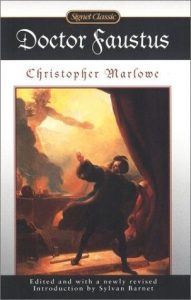
 Literature Guides
Literature Guides
Dr. Faustus Themes and Symbols
Themes and Symbols
Sin, Redemption, and Damnation
Doctor Faustus is a Christian play, as such it deals with themes at the root of Christianity and its views on the world. First, there is the concept of sin, which Christians define as being acts that go against the will of God. By making a pact with the Devil, Faustus commits the ultimate sin – not only is he disobeying the word of God, he is willingly pledging allegiance to Lucifer.
Christians believe, however, that even the most evil wrongdoings can be forgiven through the power of Christ, son of the Lord, who died on a cross for the sins of mankind, so that they may have ever-lasting life. Meaning, that no matter how horrible Faustus’s pact with Lucifer might be, the chance for redemption always exists.
All he needs to do is seek God’s forgiveness. In the play, there are several times when it appears that Faustus is weighing out the possibilities of redemption, however, his continues to remain loyal to Lucifer. Turning away from God condemns him to damnation. Only when it is too late does Faustus truly desire to repent.
Power as a Corrupting Influence
In the beginning of the play, prior to Faustus’s pact with Lucifer, he is overflowing with ideas of how to use the power he desires. He fantasizes about great fortunes, but also desires to learn more about the great mysteries of the universe and wants to redraw the map of Europe. Despite these plans not being entirely admirable, they are certainly ambitions and capable of inspiring an awe of sympathy.
Blood
Blood plays a number of symbolic roles in Doctor Faustus. When he first signs away his soul, he does so in blood, signifying the permanent and ungodly nature of this agreement. His blood congeals on the paper, signifying his body’s rebellion against what he plans to do. Meanwhile, the blood of Jesus Christ, seen by Faustus running across the sky during his final evening, is said to be symbolic of the sacrifice that Jesus made on the cross.
The Good Angel and the Evil Angel
Early in the play, the angels each appear on the shoulders of Faustus. One urges him to repent and devote his life to serving God, the other urges him to follow his desires and to serve Lucifer. Each symbolize the division of will, part of which desires to do good, where the other is shrouded in sin.



